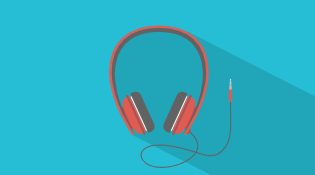
Have you ever caught yourself mindlessly humming a song you heard earlier that day? Or tapping along to a song on the radio?
If so, congratulations, you were playing music by ear!
Playing music by ear is simply the ability to hear music and to recreate that sound in some way.
We’re used to doing it with our voice. Somehow, we know what our vocal cords need to do to recreate a lullaby or a catchy tune we just heard.
But hand someone an instrument and playing by ear suddenly seems daunting and scary. Funny right?
Think about it: the process is similar. You listen to a sound, remember it, and then recreate it. What makes it different is the tool you’re using in the last step.
So playing music by ear is about gaining control over your instrument in the same way you can control your voice.
Once you do that, you can instantly play any melody or chord you hear in your head.
Many people assume that playing by ear is something only the most talented musicians can do. But they’re wrong. The ability to figure out a melody by ear is something that simply requires practice, just like learning a new guitar chord, strumming pattern or technique.
In this article, I’ll show you how you can learn to play by ear. I’ll give you some actionable strategies both for beginners and more advanced musicians.
Section 1
Playing by ear vs. reading sheet music
For example, if you’re looking to learn classical piano, reading is simply essential. Classical music has a ‘written’ tradition, where composers create sheet music which is then performed by a Classical musician. Most performers read sheet music on stage too.
By contrast, most other musical styles have an ‘aural’ tradition. This includes jazz, blues, traditional folk music and popular music genres from metal, punk to classic rock, and hiphop. Performers in these genres usually don’t have music stands and sheet music on stage. They learn music by listening to recordings and figuring out how to play what they hear by ear. What’s more, these genres tend to have more improvisation and soloing than Classical music.
I’m generalising a bit here. But for most non-classical musicians, it is more practical and more useful in their day-to-day playing to learn to play by ear. Of course, the ability to read music is certainly useful for musicians in these genres, especially for professionals. And there are also instruments that often play in larger groups such as big bands, where sheet music is common. But overall, it makes sense to prioritise playing by ear. Aside from being useful, it’s a lot of fun and extremely rewarding to learn!
Section 2
Can you learn to play music by ear?
If you’ve had music lessons before, they were probably not focused on playing by ear. Most likely, you learned how to read sheet music or some other form of notation, and how to play what you read on your instrument. So you might wonder: why are music lessons taught that way if it’s also possible to play by ear?
There are many reasons. But perhaps the most important one is that it’s very convenient to use notation in music lessons. It allows us to point towards a piece of paper when we’re trying to explain something. In other words: it’s easier for music teachers. And many don’t know there’s a different way than this ‘old-school’ approach.
But there are different ways. In classical music, the Suzuki method focuses on ear training very early on. StringKick, this site, is largely based on the theory of Edwin E. Gordon as well as musicians such as Victor Wooten. They point out that music is a lot like language. We can think musical thoughts. And playing by ear is nothing more than learning how to express those musical thoughts. Here's Victor Wooten explaining it in his words:
Gordon and Wooten also explain that we should learn music the same way that we learn language. We all started by listening to the sounds of people around us and copying those sounds. Only at a later age, when we could already speak fluently, did we learn to read and write. That means we need to start by doing a whole lot of listening. And you’ve already started doing that: you’ve listened to thousands of hours of music! The next step is to practice recreating those sounds on your instrument.
Now, you might assume that this is something you’re born with. That it’s a natural ability that you either have or you don’t. But it really isn’t. Just like any other skill, it takes practice to get better at it. So if you’re willing to put in the effort, you can definitely learn to play music by ear. How? That’s what we’ll explore in the next two sections!
Section 3
How to play music by ear
1. Figure out music by ear
At its core, playing by ear is about having a sound in your mind and getting that sound out of your instrument. One of the best ways to practice this skill is to take a music recording, listen closely to it and work out what notes you’re hearing.
This might sound like an advanced skill, but it isn’t. Even if you’re a beginner, you can start to figure out simple melodies on your instrument. It will take some time at first, but it’s a skill like any other: you get better at it with practice! In fact, because most people have never tried this at all, they can improve quite a lot within just a couple of weeks.
For a detailed guide and tips on how to figure out songs by ear and how to get started, check out this article on learning songs by ear.
Also, if you play guitar, let’s try figuring out some music by ear right now! Take a listen to the video below. Then, grab your guitar, following the instructions below the video to figure out the correct notes in the TAB below.
This is just one exercise from my course Make Your Ears Awesome: Kick-Starter. It helps you figure out your first songs by ear with note-by-note instructions, just like the one above. You can try the first couple of lessons for free, so give it a shot!
2. Improvise
Improvisation is the second way to develop your playing by ear skills. Now, I know that improvisation might sound a bit intimidating. It’s perfectly normal to wonder: can I really improvise music? Can I come up with ‘good’ musical ideas? But consider this: you’ve listened to thousands of hours of music in your life. Your musical brain knows what good music sounds like. And it’s more than capable of coming up with musical ideas too!
Why though is improvisation another great way to develop your playing by ear skills? As we talked about earlier, playing by ear is about hearing a sound in your mind and getting that sound out of your instrument. When we figure out songs by ear, we hear a sound on a recording. But when you play by ear, you need to listen to the sounds that your musical imagination comes up with. Practicing this supercharges the connection between your musical mind and your hands!
It's important to know that not all improvisation practice is equal. A common approach to start improvising is to learn a scale and play around with that. But many players have a hard time turning a scale into music. They find themselves playing up and down scales or hitting random scale notes, without it sounding any good. Maybe you can already tell what’s missing in this approach: your musical imagination!
For some exercises that help you improvise from your musical imagination, check out this article on how to improvise on guitar.
Conclusion
How to get started today
Honestly, what you do matters a whole lot less than that you do at least something. Even if you figure out just one note by ear today, you’ll have made progress on your path towards playing music by ear. But to make this concrete, here’s a simple, but great approach. Figure out one riff or melody a day. That’s it. It can be just a few notes, that doesn’t matter. It’s doing it every day that makes the difference! If you’re a guitar player, be sure to check out Make Your Ears Awesome: Kick-Starter.
As you put in the effort, you’ll notice yourself getting faster and more accurate over time. Learning to play music by ear is not just a lot of fun, it’s key to developing a more intuitive connection with music. It’s an amazing feeling to pick up your instrument and to feel the freedom to be able to play whatever your musical imagination comes up with. So start today!


![Title image for How to Learn Songs by Ear [Complete Step-by-Step Guide]](https://www.stringkick.com/wp-content/uploads/2015/04/Learn-Songs-By-Ear-Orange.png)



